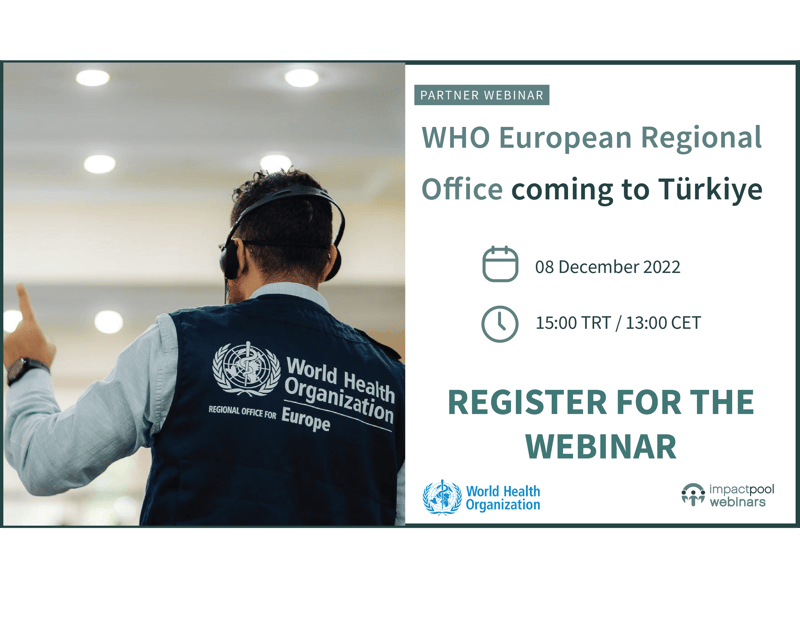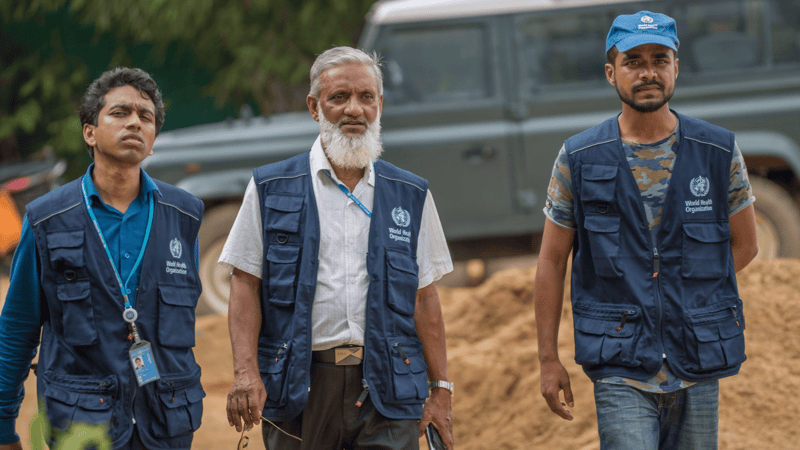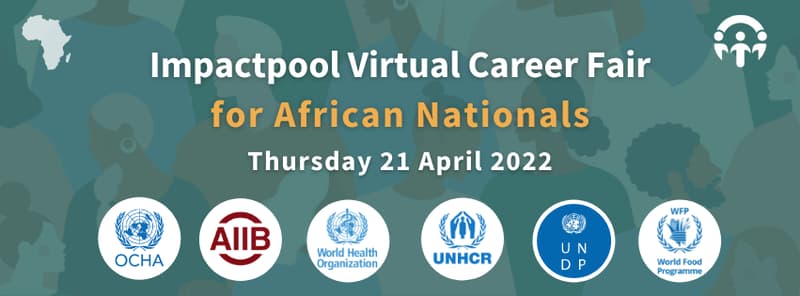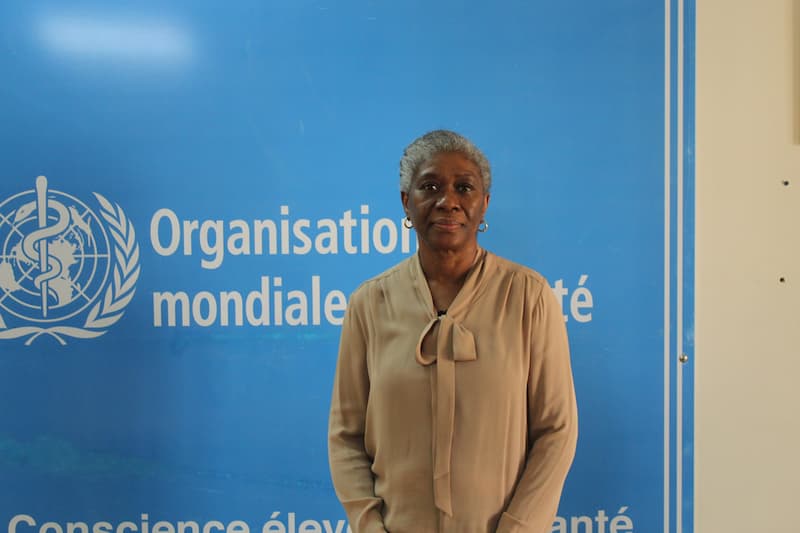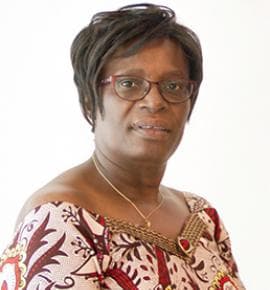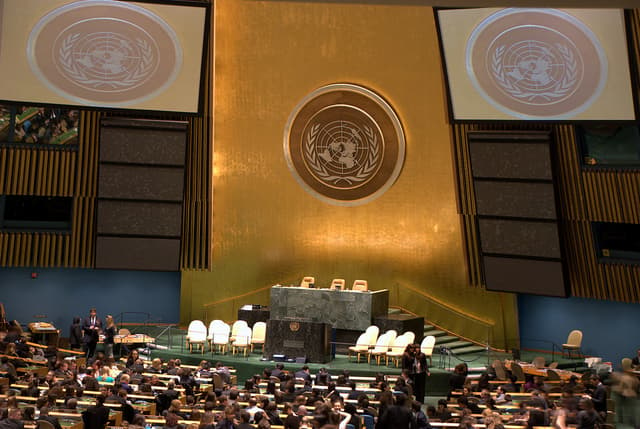Project Coordinator
Ankara
- Organization: WHO - World Health Organization
- Location: Ankara
- Grade: Senior level - P-5, International Professional - Internationally recruited position
-
Occupational Groups:
- Project and Programme Management
- Managerial positions
- Closing Date: 2023-12-02
OBJECTIVES OF THE PROGRAMME
All Member States of WHO in the European Region share the common value of the highest attainable standard of health as a fundamental human right. All of WHO's actions are based on this and rooted in the underlying value of equity as described in the General Programme of Work.
The 13thGeneral Programme of Work defines the mission of WHO as one to promote health, to keep the world safe, and to protect the vulnerable. The GPW calls for heightened accountability, prioritizing impact and outcome at country level, and to improve the lives of three billion people, through universal health coverage, through addressing health emergencies, and promoting healthier populations.
WHO's mandate revolves around six core functions:
(i)providing leadership on global health matters;
(ii)shaping the health research agenda;
(iii)setting norms and standards;
(iv)articulating evidence-based policy options;
(v)providing technical support to countries; and
(vi)monitoring and assessing health trends.
The European Region (EURO) of WHO is made up of 53 countries, with over 880 million people. The diversity of people and health situations requires, on the demand side, a solid understanding of the emerging socio-economic, epidemiologic and demographic patterns and trends at both aggregate as well as national and sub-national levels, with due sensitivity to disadvantaged populations and vulnerable segments of the society. On the supply side, it is equally crucial to have a solid understanding of the commonalities and divergences of the health systems, the circumstances and political economy under which they have evolved and operate and, more specifically, how these bear upon the way the health system stewardship function of health ministries is carried out.
The mission of WHO's Health Emergencies Programme (The Programme) is to help countries, and to coordinate international action, to prevent, prepare for, detect, rapidly respond to, and recover from outbreaks and emergencies
DESCRIPTION OF DUTIES
Summary of Assigned Duties:
To coordinate and oversee the development, planning, management, adaptation and monitoring of strategies and work plans related to the timely and successful implementation of the project on Strengthening national capacities against COVID-19, in compliance with the WHO procedures. Ensure the concerted approach of WHO in providing the required expert advice and support to the national authorities.
Key duties:
1.Lead the development, planning, implementation, adaptation and monitoring of strategies, operational and detailed task-based work plans to achieve the DOA's expected results, in alignment with the EU contribution agreement, for the COVID-19 related project.
2.Conduct needs assessment and analysis of project activities (financial, human resources, assets, etc.); coordinate the mobilization of the required resources to ensure that health threats are being detected, verified, and responded to in a timely, complete and accurate manner.
3.Monitor the implementation of the programme and related grants according to established key performance indicators, ensuring that expenditure and reporting are in compliance with WHO rules and donor agreement. Analyze risks and implement mitigation measures.
4.Develop strategic partnership with the MoH and other partners, advocate on policies and best practices in consultation with the Regional Office; ensure that the required national procedures, skills, coordination mechanisms and health systems are strengthened to manage identified risks.
5.Establish and manage the task force for the coordination of project activities and related committees (Steering Committees, Advisory Committee etc.).
6.Contribute to strengthening the national capability to prepare and respond to health emergencies from all hazards. Oversee the workforce capacity building and training activities at central and provincial level.
7.Implement, in cooperation with the MoH, visibility activities related to the programme; authorize the release of related information, communications, advocacy products and statements to internal and external partners.
8.Design standardized methods of capturing and consolidating evidence-based health interventions, document lessons learnt, best practices and trend analyses for promoting accountability, responsiveness and transparency.
9.Represent WHO in high level meetings with donors and partners. Prepare related technical documents, concept papers, presentations, situation analysis and develop periodic progress reports.
10.Perform other duties as required by the WR.
REQUIRED QUALIFICATIONS
Education
Essential: Advanced university degree in medicine, public health, epidemiology or communicable diseases from an accredited/recognized institution.
Desirable: Specialized training in emergency and outbreak management and/or Early Warning and Response System.
Experience
Essential: At least 10 years of related experience, at the national and international levels, in multi-sectoral coordination, strengthening country capacities and responding to emergencies and disasters, including infectious disease outbreaks, natural disasters or complex emergencies. Experience in project management and coordinating operational activities in preparedness and response, with a range of actors.
Desirable: Relevant work experience with WHO and/or UN agencies, health cluster partners; experience working in relevant nongovernmental or humanitarian organizations.
Skills
·Excellent skills in the assessment, monitoring, analysis and evaluation of emergency situations, with the ability to conceptualize and implement innovative strategies and advocate their implementation.
·Demonstrated ability to identify and manage difficult situations, to lead and direct multidisciplinary and multinational staff.
·Strong strategic thinking, with the ability to quickly comprehend strategic and tactical objectives and to formulate comprehensive plans to address challenges/risks.
·Strong operational competencies in managing and coordinating humanitarian program cycle, including efficient human and financial resource management.
WHO Competencies
Teamwork
Respecting and promoting individual and cultural differences
Communication
Ensuring the effective use of resources
Creating an empowering and motivating environment
Use of Language Skills
Essential: Expert knowledge of English.
Desirable: Intermediate knowledge of Russion, French or German
REMUNERATION
WHO salaries for staff in the Professional category are calculated in US dollars. The remuneration for the above position comprises an annual base salary starting at USD 92,731 (subject to mandatory deductions for pension contributions and health insurance, as applicable), a variable post adjustment, which reflects the cost of living in a particular duty station, and currently amounts to USD 2056 per month for the duty station indicated above. Other benefits include 30 days of annual leave, allowances for dependent family members, home leave, and an education grant for dependent children.
ADDITIONAL INFORMATION
- This vacancy notice may be used to fill other similar positions at the same grade level
- Only candidates under serious consideration will be contacted.
- A written test and/or an asynchronous video assessment may be used as a form of screening.
- In the event that your candidature is retained for an interview, you will be required to provide, in advance, a scanned copy of the degree(s)/diploma(s)/certificate(s) required for this position. WHO only considers higher educational qualifications obtained from an institution accredited/recognized in the World Higher Education Database (WHED), a list updated by the International Association of Universities (IAU)/United Nations Educational, Scientific and Cultural Organization (UNESCO). The list can be accessed through the link: http://www.whed.net/. Some professional certificates may not appear in the WHED and will require individual review.
- According to article 101, paragraph 3, of the Charter of the United Nations, the paramount consideration in the employment of the staff is the necessity of securing the highest standards of efficiency, competence, and integrity. Due regard will be paid to the importance of recruiting the staff on as wide a geographical basis as possible.
- Any appointment/extension of appointment is subject to WHO Staff Regulations, Staff Rules and Manual.
- Staff members in other duty stations are encouraged to apply.
- The WHO is committed to creating a diverse and inclusive environment of mutual respect. The WHO recruits and employs staff regardless of disability status, sex, gender identity, sexual orientation, language, race, marital status, religious, cultural, ethnic and socio-economic backgrounds, or any other personal characteristics.
- The WHO is committed to achieving gender parity and geographical diversity in its staff. Women, persons with disabilities, and nationals of unrepresented and underrepresented Member States (
https://www.who.int/careers/diversity-equity-and-inclusion
- ) are strongly encouraged to apply.
- Persons with disabilities can request reasonable accommodations to enable participation in the recruitment process. Requests for reasonable accommodation should be sent through an email to
reasonableaccommodation@who.int
- An impeccable record for integrity and professional ethical standards is essential. WHO prides itself on a workforce that adheres to the highest ethical and professional standards and that is committed to put the WHO Values Charter into practice.
- WHO has zero tolerance towards sexual exploitation and abuse (SEA), sexual harassment and other types of abusive conduct (i.e., discrimination, abuse of authority and harassment). All members of the WHO workforce have a role to play in promoting a safe and respectful workplace and should report to WHO any actual or suspected cases of SEA, sexual harassment and other types of abusive conduct. To ensure that individuals with a substantiated history of SEA, sexual harassment or other types of abusive conduct are not hired by the Organization, WHO will conduct a background verification of final candidates.
- Mobility is a condition of international professional employment with WHO and an underlying premise of the international civil service. Candidates appointed to an international post with WHO are subject to mobility and may be assigned to any activity or duty station of the Organization throughout the world.
- WHO also offers wide range of benefits to staff, including parental leave and attractive flexible work arrangements to help promote a healthy work-life balance and to allow all staff members to express and develop their talents fully.
- The statutory retirement age for staff appointments is 65 years. For external applicants, only those who are expected to complete the term of appointment will normally be considered.
- Please note that WHO's contracts are conditional on members of the workforce confirming that they are vaccinated as required by WHO before undertaking a WHO assignment, except where a medical condition does not allow such vaccination, as certified by the WHO Staff Health and Wellbeing Services (SHW). The successful candidate will be asked to provide relevant evidence related to this condition. A copy of the updated vaccination card must be shared with WHO medical service in the medical clearance process. Please note that certain countries require proof of specific vaccinations for entry or exit. For example, official proof /certification of yellow fever vaccination is required to enter many countries. Country-specific vaccine recommendations can be found on the WHO international travel and Staff Health and Wellbeing website. For vaccination-related queries please directly contact SHW directly at shws@who.int.
- WHO has a smoke-free environment and does not recruit smokers or users of any form of tobacco.
- For information on WHO's operations please visit: http://www.who.int.
- In case the website does not display properly, please retry by: (i) checking that you have the latest version of the browser installed (Chrome, Edge or Firefox); (ii) clearing your browser history and opening the site in a new browser (not a new tab within the same browser); or (iii) retry accessing the website using Mozilla Firefox browser or using another device. Click this link for detailed guidance on completing job applications: Instructions for candidates

